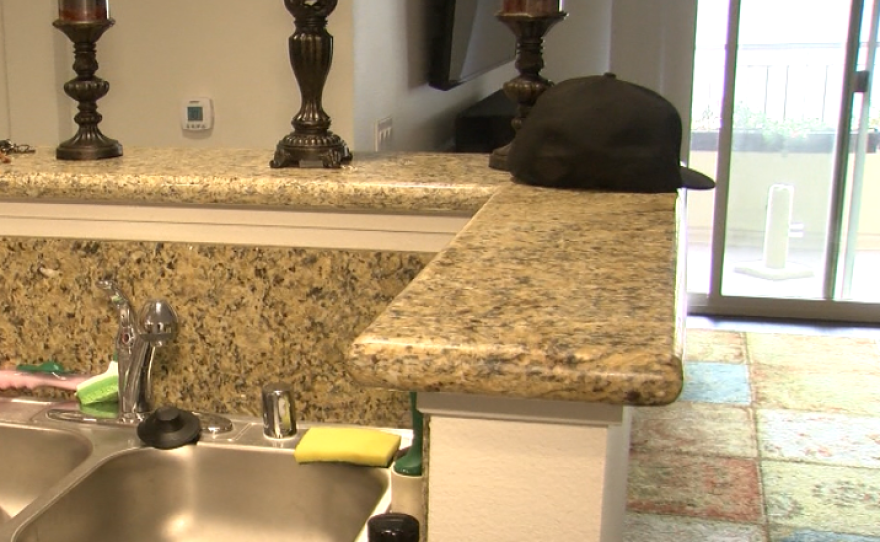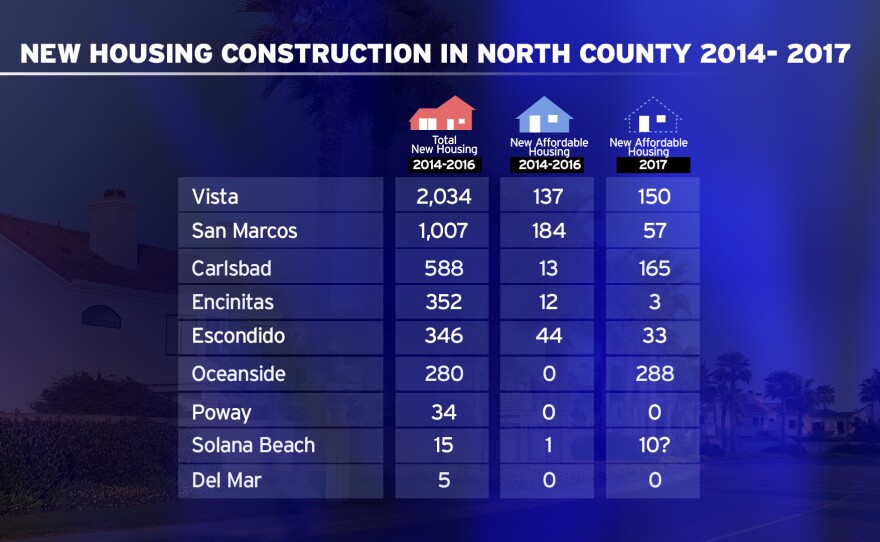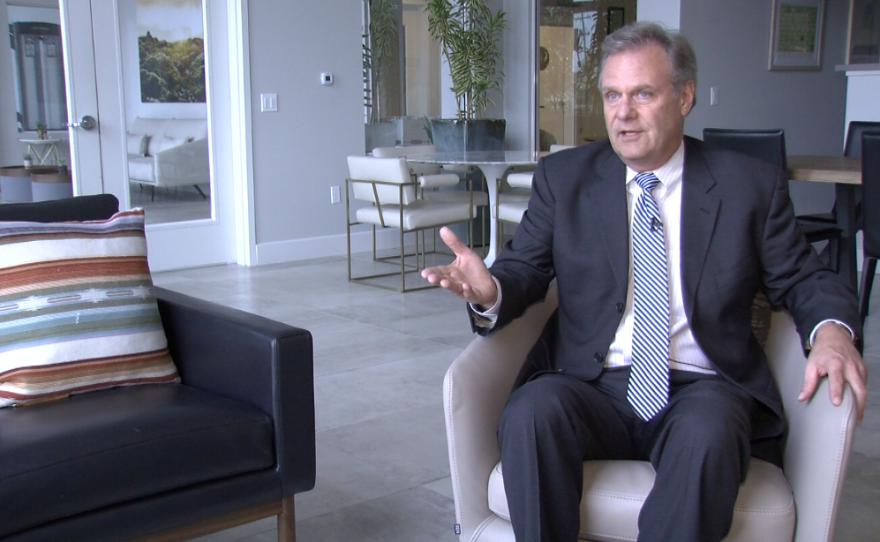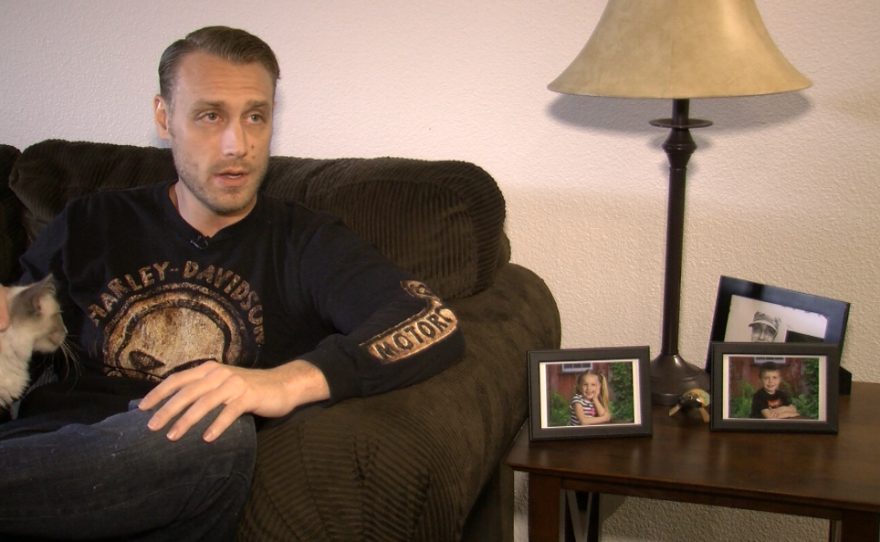The concept of “affordable housing” can conjure images of blowing trash, cracked windows and blight. But affordable housing being developed in San Diego County these days often comes with workout rooms and granite countertops.
Take the Promenade at Creekside, a new apartment complex with more than 60 units in downtown San Marcos. San Marcos is one of the North County cities that has built the most affordable housing in the last three years.
Like many new affordable housing complexes, the Promenade at Creekside has amenities you might normally expect in a luxury condo complex: a workout room, a small theater, a pool and a playground.
Gina Leftwich has been the rental manager since it opened last May. “Oh, we filled up that same day!” she said. “There’s a lot of demand for affordable housing.”
To build this affordable housing with the help of federal tax credits, the developer, North County-based Opportune Companies, had to make a commitment. Units may only rent to people who qualify — those who earn less than 60 percent of the area median income, or AMI. For this project, that means under $35,700 for a single person and under $45,9000 for a family of three.
Leftwich said the rents at The Promenade apartments are well below market rate.
“The least expensive would be $388 for a one-bedroom, and $1,221 for a three-bedroom,” she said.
It’s not surprising there is a lot of demand for these units. The market-rate rent for a three-bedroom in San Diego is now well over $2,000 per month.
Leftwich said the tenants for the affordable housing run the gamut.
“It’s a mix of everybody,” she said. “There’s seniors, there’s young families, a lot of single parents — men and women. So we’re helping a lot of different people.”
Ryan Thorne, a single dad, was one of the early occupants. During a tour of his apartment, he pointed to photographs of his children on a side table.
“This is Riley, who turned 7, and this is Reece. He’ll be 6 in May,” he said. “With two children and being a single father, I’m the only one that’s bringing in an income. Right now, combined with child care expenses and rent, I just make it.”
Thorne is campus president of a private vocational school in San Marcos. He said he put his name on the waiting list for a place at The Promenade as soon as he saw the project break ground two years ago.
Thorne’s three-bedroom unit is spare, but well-equipped. It has granite countertops in the kitchen, generous closets and a balcony.

Thorne said that besides myths about low-rent apartments, there are also a lot of stereotypes about the kind of people who live in affordable housing. But he said his neighbors are “amazing” and they come “from all walks of life: people with disabilities, people with lots of kids. They’re not in the best situation, and something like this really helps them out.”
After he moved in with his children and his cat Mew, Thorne said he discovered it was more like a community than other places he‘s lived. There’s even an activities director.
“The activities director constantly has things going on during the week,” he said. “Movie nights, crafts with the kids, a New Year’s get together. The kids really enjoy it and it gives a chance for everyone to come together.“
What is affordable housing?
Affordable housing is defined as housing that rents to people who earn under the area median income. It also depends on how many people there are in your family.
San Diego’s Area Median Income for 2016 was $73,500.
So, for example, some affordable housing is reserved for “extremely low-income” families: people who earn less than 30 percent of the AMI. For a single person, that is $17,850. For a family of four, that is $25,500.
“Very low-income” housing is reserved for people who earn 50 percent of the AMI. For a single person, that is $29,750. For a family of four, that is $42,500.
And “low-income” housing is for those who qualify by earning less than 80 percent of AMI. For a single person, that is $47,600, and for a family of four, $68,000.
A definition that can confuse the issue is moderate-income housing, for people who earn between 81 percent and 120 percent of AMI. At this level, earnings are quite high, so housing estimates that include housing for “low-and moderate-income families” tend to obscure that fact that most of it is not affordable.
North County’s rents are the highest in the region, partly because so few new houses have been built.
How much new affordable housing have North County cities built recently?
A KPBS survey of North County showed coastal cities — constrained for land and with high land prices — have added far less affordable housing than the cities along Highway 78.

Del Mar, Solana Beach and Oceanside have built virtually no affordable units in the last three years.
But Oceanside added 139 units four years ago in 2013, and 288 units are in the works to open later this year. Assistant City Manager Deanna Lorson said job growth has not kept pace with housing in Oceanside and the city is focused on a plan to increase jobs to support residents in the future.
Del Mar’s Deputy Mayor, Dwight Worden, has written a paper called “Cracking the Conundrum,” proposing various strategies to meet the city’s affordable housing goals. They include the city buying units to rent, and requiring new granny flats to have affordable rents. He has a mantra: “five in twenty,” which means five new affordable units within the next 20 years. It remains to be seen whether he can achieve his goals politically. Del Mar residents voted in November not to pass an ordinance that would have made it more difficult to permit new, more dense construction.
Solana Beach has been struggling for years to get a 10-unit affordable housing project called “The Pearl” approved, in the face of lawsuits from neighboring condo owners. City Manager Greg Wade said he optimistically hopes to get the permit in 2017.
Poway is the only inland city to have added no new affordable units since 2014. The city recently rejected a 22-unit affordable housing project for veterans that had been several years in the making.
Encinitas is the only city in San Diego that does not have an approved state Housing Element, a plan of where new housing can be built. Residents rejected a compromise plan in November, and further litigation is expected. Half of the 12 new affordable housing units the city has built recently came as a result of a “density bonus” incentive that allows developers to build more houses on a lot if they include an affordable unit.

Carlsbad has major developments ongoing in Robertson Ranch and Quarry Creek. Like many cities, Carlsbad requires 15 percent of new construction over seven units to be affordable or developers must pay an in-lieu fee. However, affordable includes low- and moderate-income housing. Community relations manager Jessica Bowen said new projects will include 101 apartments for low-income seniors and 64 apartments for rent to low-income families.
Escondido has added new affordable housing by allowing Urban Housing Communities to rehab and convert 44 market-rate units into affordable units. The city also preserved almost 300 affordable homes when Community HousingWorks and KDF Communities invested in rehabbing older units.
Solutions for Change, an organization that has worked with the homeless population for years, is building 33 units in Escondido, reserved for families with extremely low incomes (less than 30 percent of the AMI).
Vista completed a multi-family project near the Sprinter light rail line last year, with some funding from the San Diego Association of Governments, which offers incentives to build near public transit. The 759-unit project included 137 affordable units.
San Marcos appears to have added more affordable units than any other North County city. Mayor Jim Desmond said his city council has not been afraid to put in affordable housing where it fits.

“We’ve got over 3,300 affordable housing units in the city of San Marcos, which is about 10 percent of our total housing units in the entire city,” he said. “And I bet if you took somebody around and gave them a tour, they couldn’t even be able to point and say ‘that’s affordable housing’ or ‘this is affordable housing,’ because it all looks beautiful."
For the developer of these apartments, the profits are less than building market-rate homes, but the risks are also lower. For one thing, there will never be a problem finding tenants. Rental manager Leftwich said she expects it will be five years until any vacancies open up at The Promenade.
“We have approximately 700 people on the waiting list at this time,“ she said.
One reason San Marcos had little trouble getting this project approved is there are no older neighborhoods nearby to object to the 60 new families who have moved in.






